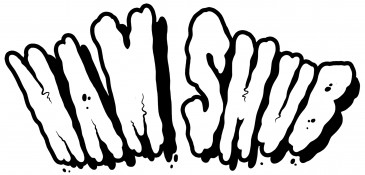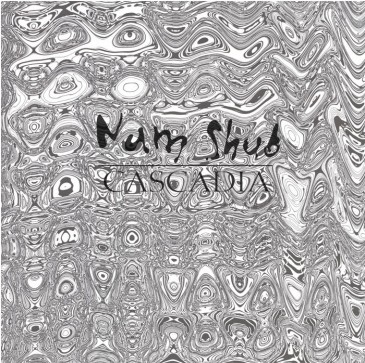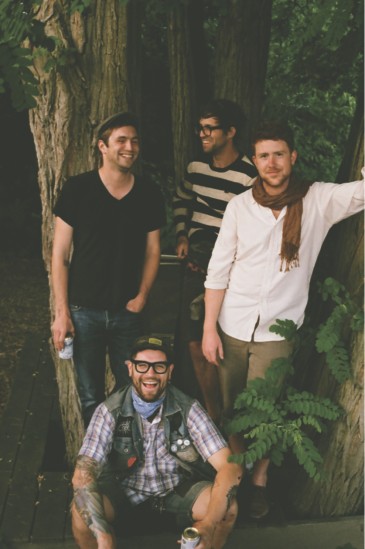
I’m sitting with Nam Shub — Bill Young (guitar/vocals), Scotty Boe (synths), Caton Diab (bass), and Matty Harris (drums) — in the alley outside Diab’s house, drinking beer and learning Cantonese from tiny bottle collectors. Between squirrel sightings and chemtrail conspiracies, the band chronicles their three-year history leading up to last month’s release of their first album, Cascadia. “We went through a lot of different sounds early on,” Young explains, “and many of the songs on the record came together over that time [two years ago]. We recorded them in November of that year, so we’ve been sitting on them for a while now.”
One listen to Cascadia’s dynamic opener “Original Wizards” gives a pretty clear idea of what Young means by “different sounds.” A chaotic blend of glitchy synths, sharp bass lines and shoegazey, vibrating guitar leads come together in a psychedelic mash that, at 11 minutes, is a spacey medley that borders on jam-session. One might think that the long wait for Nam Shub’s debut is partly thanks to the vast complexity of sound on each of its six tracks, but according to the group, the reality was a lot more logistical.

“We recorded the songs over two days, live, in 2010. Once every two months we’d try to have a mixing session,” recants Diab, “but some of it was a financial issue.” The album’s saving grace came in the form of Chris Cantrell, of File Under: Music, a local independent group that develops and supports Vancouver artists. “He kicked our asses into gear. He was starting his own label at the time, and he wanted to use us as his guinea pig.”
Fast-forward the release process, and Nam Shub are excited to have something physical out in the world. The group was adamant about putting Cascadia onto vinyl, and it’s easy to tell that the band is excited about seeing it in the stacks at local record stores. But the boys are equally excited to pave ahead as a constantly evolving psychotic music machine.
“I visualize creativity as a room in a house, and each creative project or album that I’ve started working on is a new thing in that room, a new piece of furniture. It’s not until you finish that thing that you have the space to start working on [something new],” Young says.
“It’s like having a yard-sale,” Diab pitches in. “Nam Shub is a yard-sale.”

Despite the songs on Cascadia being two years old, the band insists that it’s two years fresh. “There’s a whole bunch of potential trajectories for our sound,” Young muses.
“We could drop a seven-inch of the most abrasive noise ever, and then an album of straight-up kraut[rock],” adds Harris, “and it would still work in the context of the band.”
Wind the clock back a few days before our alley meeting, and I’m standing in Zoo Zhop having my mind melted by the quartet’s sonic-bending skills. If you took a little bit of My Bloody Valentine’s Loveless, added a healthy dose of Toronto’s Holy Fuck, and then threw it into a woodchipper and smoked the result, you might have something similar to what was taking place in the tiny venue. Boe cues up found sound, field recordings and synthesized speeches between and during songs (despite his insistence that he’s, “Just here to turn knobs, man.”) and the crowd can’t quite figure out whether they should close their eyes and meditate or dance spastically next to one another. On the trippy, beautiful “Orbit,” it’s easy to understand why it might be hard to choose, and according to Young, that’s exactly the way the band wants it.
“Tapping into people’s minds, in a subliminal sense, musically I find really interesting. Music is this beautiful space where you can communicate with people, potentially, on a deeper, non-conceptual level. It’s not rooted in the filters of language, so you can really affect people in different and new ways.”
Improvisation plays a big part in Nam Shub’s constantly-shifting soundscape, even if the crowd doesn’t always realize it. “It’s actually a point of contention within the band,” Diab adds, “how long we get to jam [at shows] and how long we have to play actual songs.” For most of the band’s gigs, it seems like the mix is 50/50.
For Music Waste in June, Nam Shub helped celebrate the opening of the Nines, the new multi-function gallery, for its inaugural aural experience. Despite a heavy parking ticket, the band enjoyed the new experience, particularly since the musicians are all heavily involved in the Red Gate Collective’s ongoing attempts to establish a new location.
“Any new venue is a good venue,” says Harris, but Boe seems to echo the sentiments of the group when he says, “It was a funny venue for us to be booked in. Three of the walls are glass, and we’re a loud band.”
“The bands that played before us were about a thousand decibel levels [quieter],” Diab adds. “And the organizer tells us before our set, ‘That was really nice. It was good what those bands did, and we’re looking forward to you guys. Just keep it around the same level, okay?’ It’s a big problem because we’re loud as shit. We’re constantly turning up volume to match each other, so by the end of [that] show we had the whole place vibrating. We had each frequency meeting in the middle to create some sort of drone, the almighty ‘ohm’.” It’s a happy byproduct that the “ohm” is usually dance-friendly, too.
Nam Shub played September 5 at the Astoria with Swansona and Ian William Craig.

